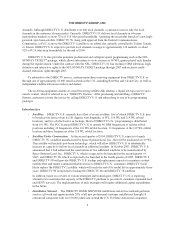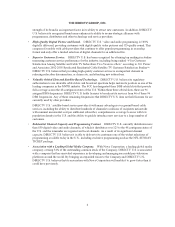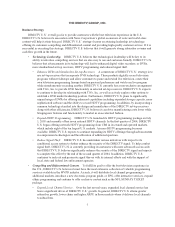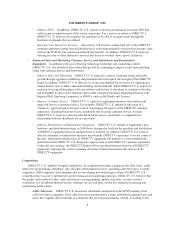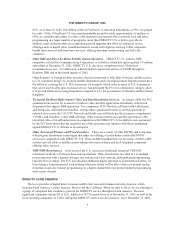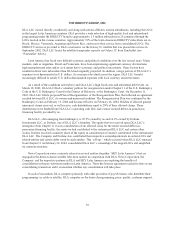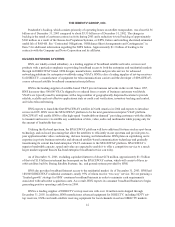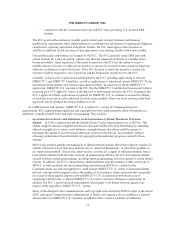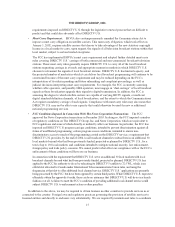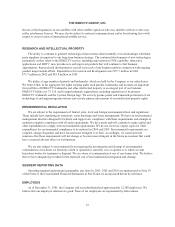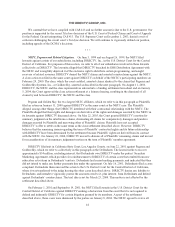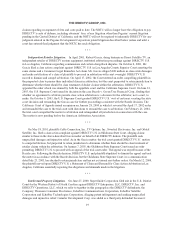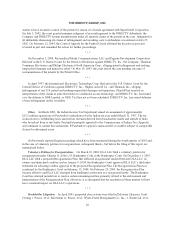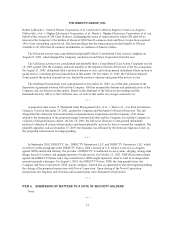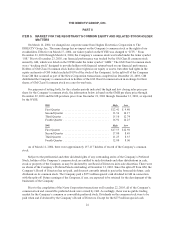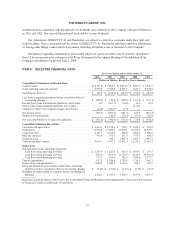DIRECTV 2003 Annual Report Download - page 21
Download and view the complete annual report
Please find page 21 of the 2003 DIRECTV annual report below. You can navigate through the pages in the report by either clicking on the pages listed below, or by using the keyword search tool below to find specific information within the annual report.THE DIRECTV GROUP, INC.
• compliance with the Communications Act and FCC rules governing U.S.-licensed DBS
systems.
The FCC grants authorizations to satellite operators that meet its legal, technical and financial
qualification requirements. Such authorizations are conditioned on satisfaction of ongoing due diligence,
construction, reporting and related obligations. Further, the FCC must approve the relocation of
satellites to different orbital locations or the replacement of an existing satellite with a new satellite.
Our satellites and earth stations are licensed by the FCC. The FCC generally issues DBS and earth
station licenses for a ten-year period, which is less than the estimated useful life of a healthy direct
broadcast satellite. Upon expiration of the initial license term, the FCC has the option to renew a
satellite operator’s license or authorize an operator to operate for a period of time on special temporary
authority, or declines to renew the license. If the FCC declines to renew the operator’s license, the
operator would be required to cease operations and the frequencies would revert to the FCC.
Currently we have several applications pending before the FCC, including applications to relocate
DIRECTV 3 and DIRECTV 5 satellites, as well as applications to launch and operate DIRECTV 7S, the
second spot-beam satellite and various replacement satellites. In connection with the DIRECTV 3
application, DIRECTV U.S. reported to the FCC that the DIRECTV 3 satellite had been moved without
receiving prior FCC approval, which could subject it to enforcement action by the FCC. In general, the
FCC’s approval of these applications is required for DIRECTV U.S. to continue to expand its offering
of local-into-local service into additional local television markets. There can be no assurance that these
approvals will be obtained in a timely fashion or at all.
As a DBS licensee and operator, DIRECTV U.S. is subject to a variety of Communications Act
requirements, FCC implementing regulations and copyright laws that could materially affect its business as a
distributor of multi-channel video and audio programming. They include:
•Local-into-Local Service and Limitation on Retransmission of Distant Broadcast Television
Signals. In 1999, Congress enacted the Satellite Home Viewer Improvement Act, or SHVIA. This
statute sought to increase competition between cable and satellite television distributors by amending
federal copyright law to create a new statutory copyright license that allows satellite carriers to
retransmit the signals of local broadcast television stations in the stations’ local markets, without
obtaining authorization from the holders of copyrights in the individual programs carried by those
stations.
SHVIA also permits satellite retransmission of distant network stations (those that originate outside of a
satellite subscriber’s local television market) only to “unserved households.” A subscriber qualifies as
an “unserved household” if he or she cannot receive, over the air, a signal of sufficient intensity from a
local station affiliated with the same network. In implementing SHVIA, the FCC has required satellite
carriers to delete certain programming, including sports programming, from the signals of certain distant
stations. In addition, the FCC’s interpretation, implementation and enforcement of other provisions of
SHVIA, as well as judicial decisions interpreting and enforcing SHVIA (as codified in the
Communications Act and copyright laws), could hamper DIRECTV U.S.’ ability to retransmit distant
network and superstation signals, reduce the number of its existing or future customers that can qualify
for receipt of these signals, impose costs on DIRECTV U.S. in connection with the process of
complying with the rules, or subject DIRECTV U.S. to fines, monetary damages or injunctions. In
addition, the FCC’s sports blackout requirements, which apply to all distant network signals, may
require costly upgrades to DIRECTV U.S.’ system.
Many of the changes to the Communications and Copyright Acts enacted by SHVIA expire at the end of
2004, and require Congressional re-authorization. A failure of Congress to do so could have a material
adverse effect on DIRECTV U.S.’ business. In addition, there could be a number of additional
14


